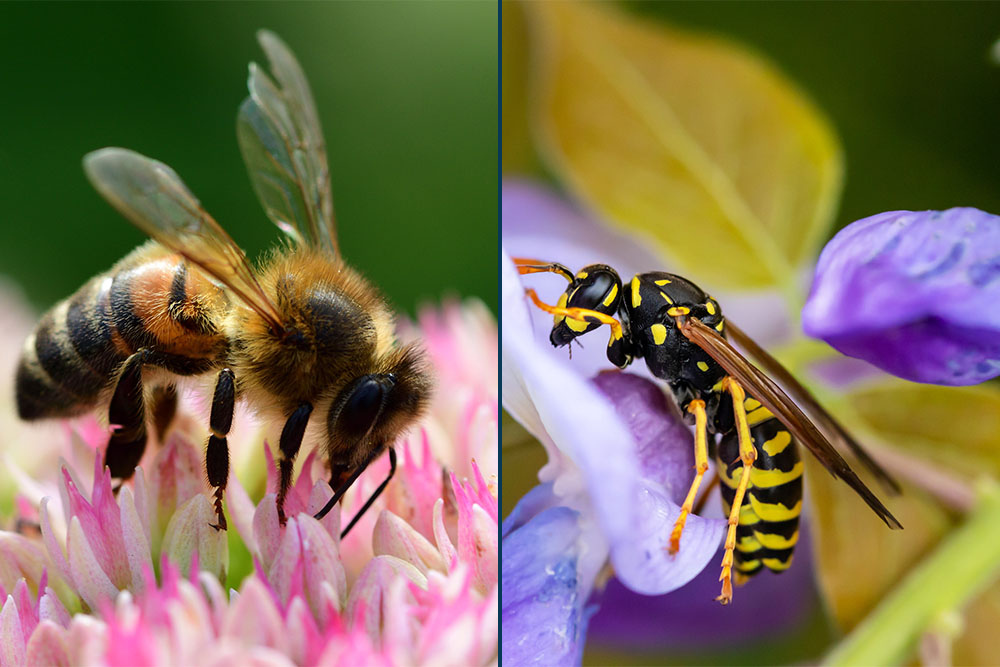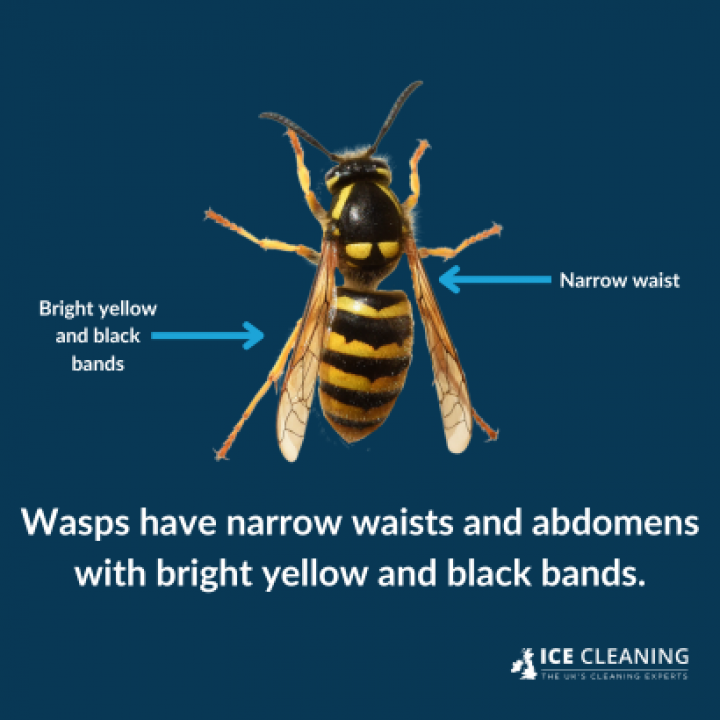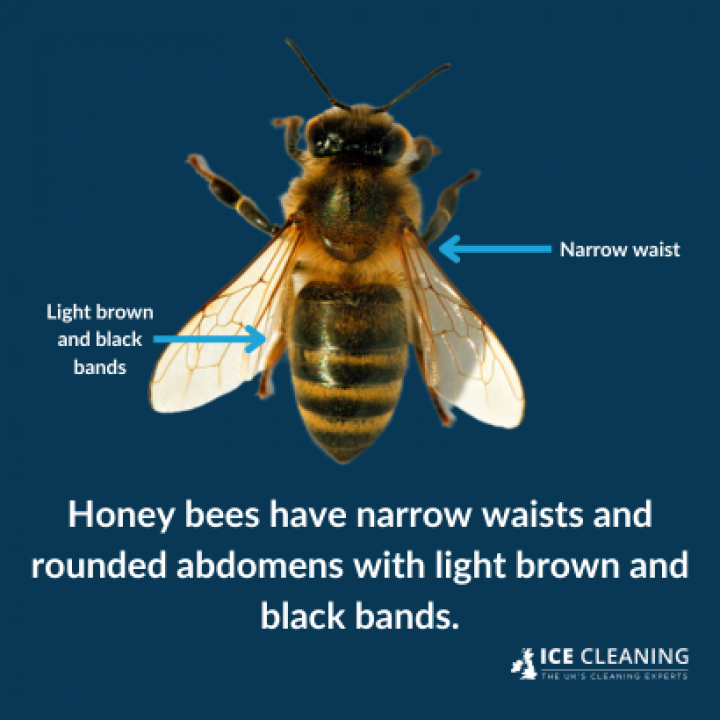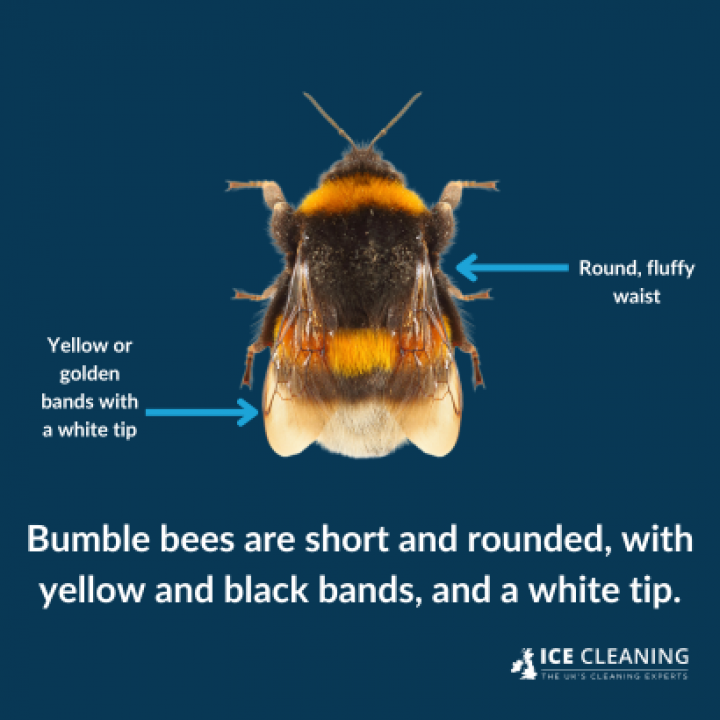The Difference Between Bees And Wasps

CONTENTS
- When do bees and wasps start to appear?
- How to tell the difference between bees and wasps
- How to identify bees and wasps’ nests
- The risks of nests on your property
- How to prevent wasps and bees from nesting
- What to do if you spot bees or wasps
- Get in touch
When the warm weather rolls in, it is time for insects to leave hibernation and begin the pollination cycle. The planet's ecosystem relies heavily on pollinators like bees, butterflies, and beetles, so protecting bees and differentiating them from wasps is integral.
ICE Cleaning offers various service lines like pest control, where our technicians will effectively eradicate invasive insects including wasps. We employ several methods of wasp nest removal depending on the circumstances and aim to achieve a non-destructive elimination.
Read on to learn about the difference between wasps and bees.
When do bees and wasps start to appear?
One of the main reasons why bees are mistaken for wasps so often is the time of year when these insects come out. Unfortunately, bees and wasps share a similar life cycle, where they emerge from the start of spring to the beginning of autumn.
You usually see more bees and wasps in the peak of summer from June to August, but this depends on the temperature and local wildflowers. As soon as the temperatures drop, these insects will either go into hibernation or die from the cold temperatures.
How to tell the difference between bees and wasps
Bees and wasps are often mistaken for one another due to their body shape and colour, but they can be identified easily. Wasps and honeybees share some similarities in body shape, but their colours are different upon observation.
A wasp's body will have bright yellow and black bands around its abdomen and a very narrow waist. Honeybees have a similar waist, but their abdomens are more rounded and larger, with light brown and black stripes. Bees have visible hair, whereas wasps are shiny and almost hairless.
Other species of bees like masonry and bumble bees are easier to identify apart from wasps. They are fuzzy in appearance with shorter bodies and thick legs, especially bumblebees which are very rounded and hairy with only one or two yellow bands.



How to identify bees and wasps’ nests
Wasps build their nests very differently from bees, which makes them easier to identify by the nests they return to. Although both species build their nests in hidden and secure areas, wasps can be destructive when they nest and settle down.
Honeybees usually build their nests in hidden areas like rock cavities and hollowed trees, and when exposed, they are slim, waxy combs. Bumblebees, however, create their nests underground near long grass or in abandoned mouse holes.
However, wasps favour manmade structures for their nesting grounds. Their nests can be found in sheds, garages, lofts, and underground. Where bees have a waxy texture to their nests, wasp nests look like paper balloons that are grey in colour.
The risks of nests on your property
The likelihood of a bee colony nesting on your property or inside your house is small. However, if you spot bees or wasps flying into your home through a hidden alcove, there may be a risk to you.
If bees nest in your home, the wax and honey will eventually cause structural damage, staining the surfaces and attracting pests due to the sweet smells. If bumblebees are present, they usually pose no threat as their nests are temporary and they will in time move on.
Wasps are destructive when they build their colony and nest. They create their hives by chewing wood, plasterboard, insulation, and polystyrene. As their colony increases, the nest will grow, and the wasps will chew through structural materials and expand.
If wasps have nested in your home, they will cause damage to the structure by chewing through various materials to expand the nest. This can lead to permanent structural damage and lowered energy efficiency, potentially deteriorating a property.
How to prevent wasps and bees from nesting
It can be difficult to prevent these insects from nesting on your property, especially if local bees are favouring your plant life for pollination. It is generally encouraged to plant wildflowers on your property to boost pollination, but this may attract honeybees or bumblebees.
Firstly, you should inspect the entirety of your property, both outdoors and indoors. It is integral that you identify any vulnerabilities in your building and do the following:
- Seal any openings or holes around the exterior of your home with caulk or putty
- Fill any holes in the garden with dirt or rocks
- Cover compost bins, dustbins, and recycling bins
- Keep water buckets and pool pumps closed
- Clean up after yourself if you eat outside
- Remove fruit from the trees or ground immediately
What to do if you spot bees or wasps
Keep your distance if you see a cluster of bees – a swarm – or a nest on your property in an unsafe place, and contact an ethical bee removal company. Swarming bees are docile, but active bees in their hive may try to sting you to protect their brood and resources.
Do not hire a pest removal service for bees, as they are important pollinators and endangered. Instead, you should contact the British Beekeepers Association for swarm removal or a local bee relocation service for removing a nest. Ensure that these companies are ethical and intend to relocate instead of kill.
For wasps, you should not try to destroy the nest yourself. Wasps are more aggressive than bees and can sting more than once, causing swelling and pain. You should contact a pest removal service that specialises in wasp removal and help you in preventing their return.
Get in touch
At ICE Cleaning, we offer excellent pest control services where we can identify and remove a wasp nest efficiently with state-of-the-art technology. Our technicians are equipped to handle the dangers of a wasp infestation, effectively removing all traces of the nest and any wasps remaining.
If you would like to learn more about our pest control service lines, please get in touch with us today at 0208 066 0360 or enquiries@icecleaning.co.uk. We operate 24/7, and we can send a technician to your location in a matter of hours in an emergency, including bank holidays.

Speak with me today,
I’m here to help
By asking you a few questions either via phone or email I can immediately provide a realistic estimation of the cost.
You’re in good company. We’ve cleaned for the following commercial clients… View all

Why choose us?
- Cater to a wide variety of cleaning situations
- Nationwide coverage, available 24/7
- Cater to commercial and domestic clients
- Free survey provided prior to quotation
- Emergency response team
- Offer a bespoke service designed to suit all your needs
- All technicians hold professional health and safety qualifications, including BICSc, IOSH, Dewpoint Professional & Safe Contractor
We’re fully accredited
We place best practise, professional expertise and health and safety at the core of our business. We’re fully compliant with all legal obligations. You can view a list of our accreditations below, or visit our Health & Safety page for more information.











-RGB-small.1707319151.jpg)




















